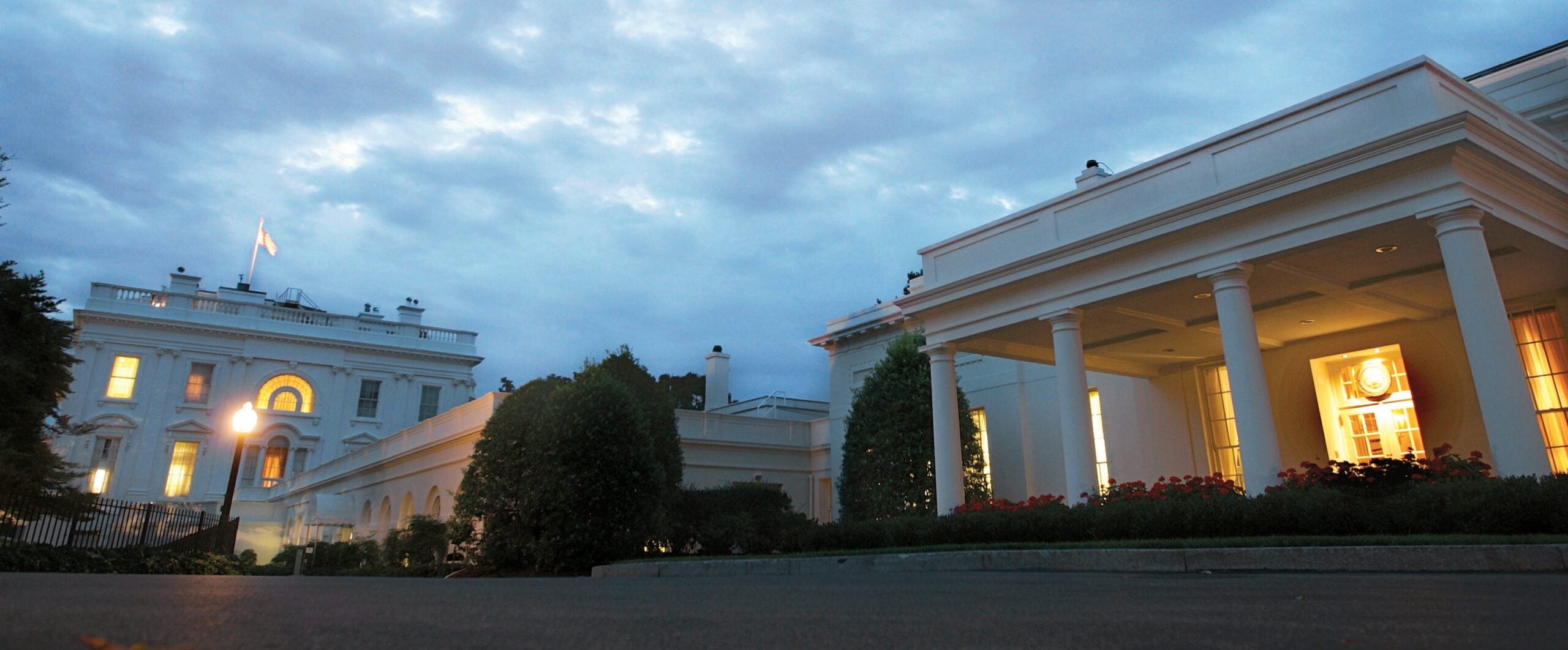Three faculty who served in the Obama administration, and recently returned to HLS, talk to writer Elaine McArdle about gridlock, being part of history, living life at warp speed and the day the Easter Bunny blacked out the White House
Professor Daniel J. Meltzer ’75, a veteran of the Carter administration, joined Obama’s transition team to oversee the preparation of executive orders that might be issued soon after the president took office. At the request of his friend Chief White House Counsel Gregory Craig, Meltzer then accepted the position of principal deputy counsel to the president, committing for one year and remaining another four months to assist Craig’s successor, Robert Bauer.
Professor David Barron ’94, an expert in constitutional and administrative law and a member of the Clinton administration, joined Obama’s team as acting head of the Office of Legal Counsel in the Department of Justice, where he worked for 18 months before returning to HLS this August.
Professor Jody Freeman LL.M. ’91 S.J.D. ’95, founding director of the school’s Environmental Law and Policy Program, served as counselor for energy and climate change in the White House for more than a year, returning to Cambridge in the spring.
The Work They Did:
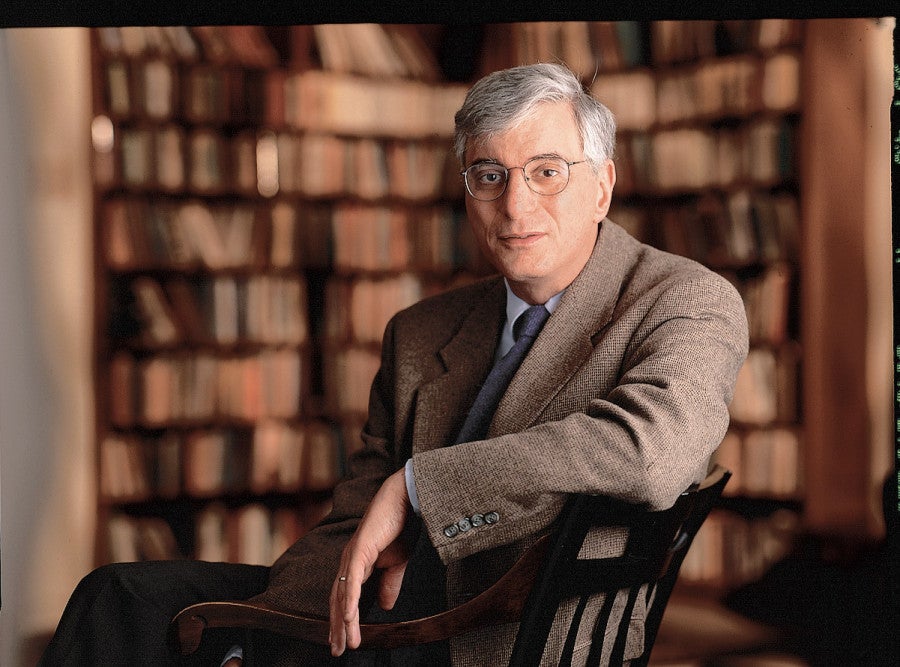
Professor Daniel J. Meltzer ’75, principal deputy counsel to the president
“A significant part of the work consists of giving advice to the president and the White House staff about compliance with a large set of rules that govern some of their activities. Examples include compliance with conflict of interest and other ethical rules, restrictions on contacts with federal agencies, compliance with the Hatch Act and other rules regulating the appropriate bounds of political activity, and issues related to the Freedom of Information Act and the Federal Advisory Committee Act. The Counsel’s Office is also responsible for making recommendations to the president on individuals nominated as federal judges and U.S. attorneys. In addition, there is a huge volume of material that comes through the office—for example, draft communications to Congress about pending legislation, proposed testimony of government officials and draft remarks of the president—all of which are reviewed by someone in the office to be sure they don’t raise any legal questions. And then there are a broad set of hard and interesting issues—a range of national security matters relating to terrorism and detention policy, or questions about positions to take in controversial litigation—in which we work with the Department of Justice to ensure that the government’s legal approach is consistent with the president’s program.”
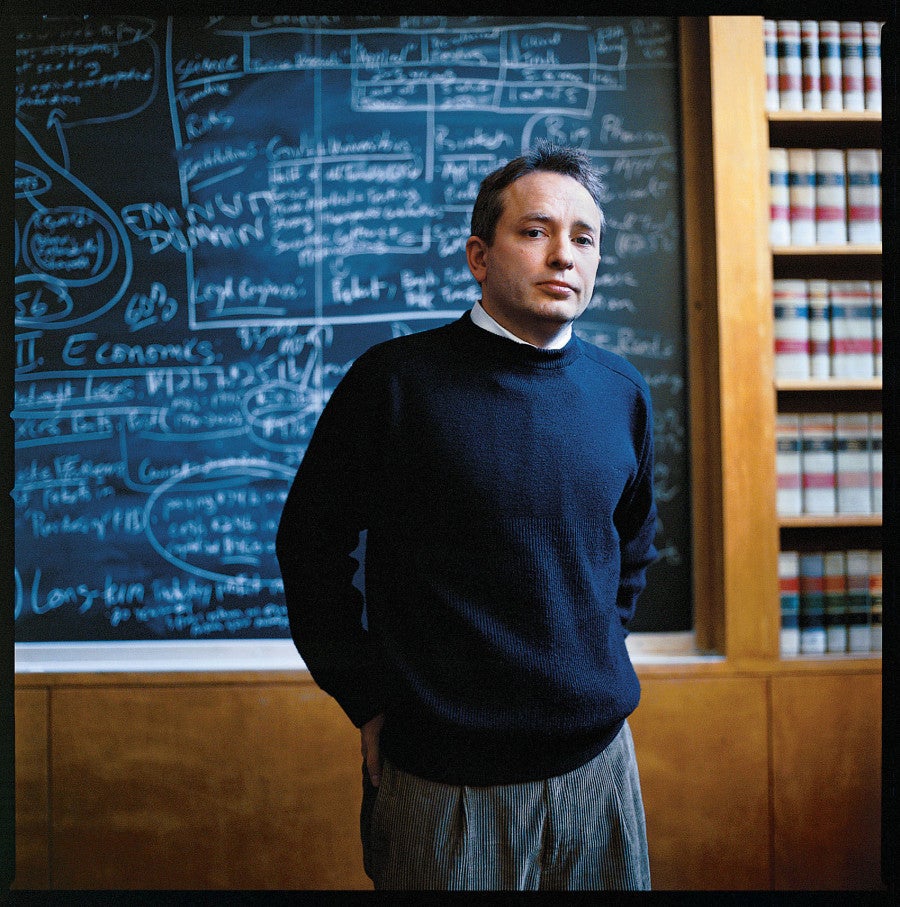
Professor David Barron ’94, head of the Office of Legal Counsel
“Our office has to approve all executive orders for form and legality, as well as reviewing all the issues about setting up the government, such as appointment issues—both statutory and constitutional questions about who can be appointed and how they can be appointed. On top of that, there was all this pending litigation that the department had to deal with, the Harriet Miers litigation [concerning whether the former White House counsel in the Bush administration could be required to appear before Congress or whether she instead had immunity] and all the pending Guantánamo litigation. And there were so many basic separation of powers issues already in court. And all the new legislation from the economic crisis—all that had to be reviewed. There was also a very ambitious legislative agenda, and we review it all.”
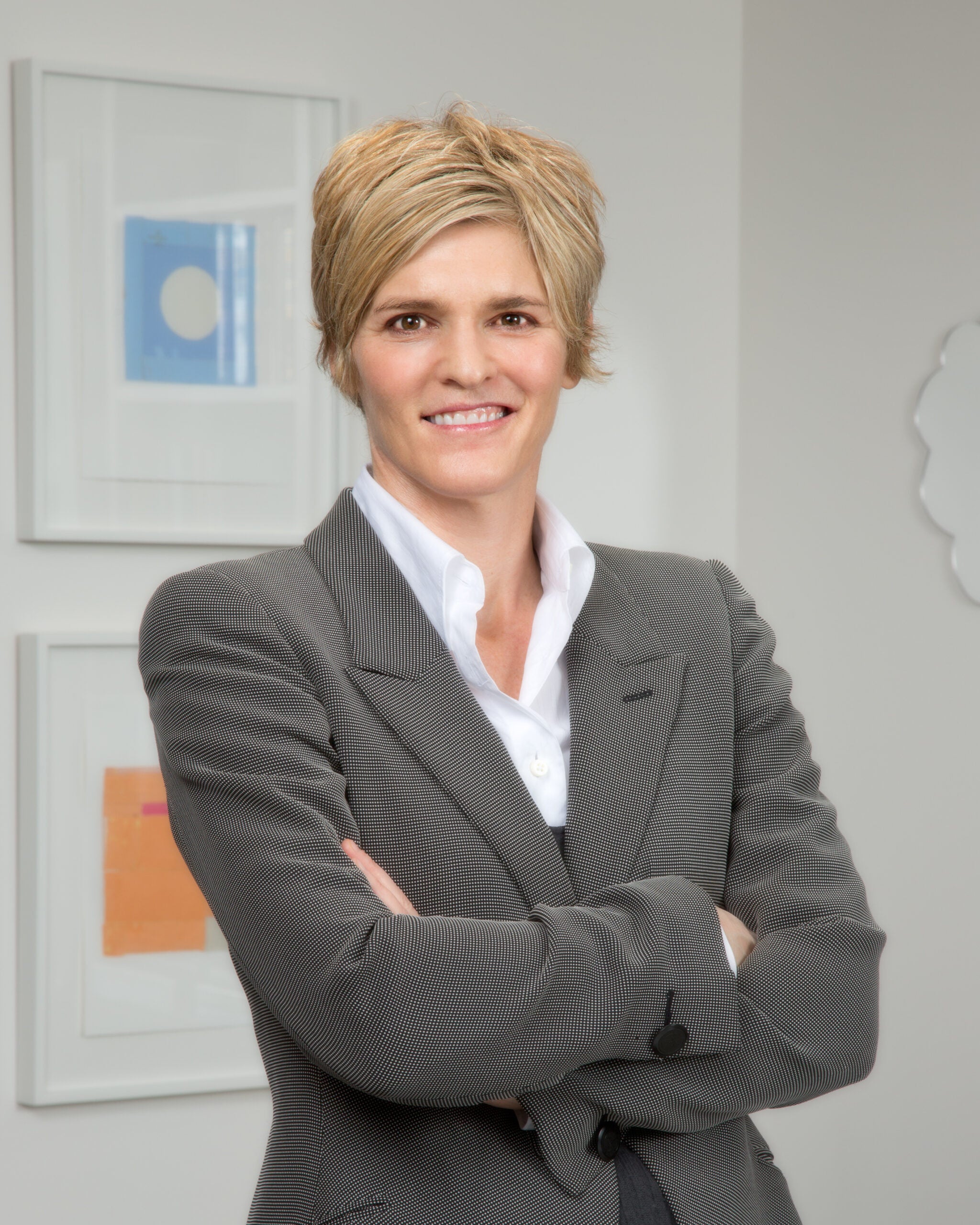
Professor Jody Freeman LL.M. ’91 S.J.D. ’95, counselor for energy and climate change
“Our office was responsible for advancing the president’s agenda on energy and climate change, and related environmental issues. This included advising the president on the use of executive power by the EPA, DOE, DOI, DOT and other agencies to make progress on his goals; leading the White House team working on passing comprehensive energy and climate legislation; and coordinating with the NSC and the State Department teams on the strategy for pursuing an international agreement in Copenhagen. The issues we worked on in the office were incredibly diverse—renewable energy, energy efficiency, transmission, biofuels, greenhouse gas regulation, green jobs—anything that related to the president’s agenda for the clean energy economy and for addressing climate change. We played a key coordinating role on a number of issues—for example, the historic fuel efficiency standards set jointly by the EPA and the Department of Transportation.”
On Jumping Right In
Meltzer: “After the inauguration, one walks into an entirely empty set of offices—no permanent lawyers, no assistants, no books, no memoranda—just desks, computers and empty bookshelves. Thus, each White House Counsel’s Office starts from scratch. The lawyers in the Bush administration’s Counsel’s Office were extremely helpful to us when we had questions, but to a certain extent you don’t know the right questions to ask until after you are already there. It’s a crazy way to run an important government legal office, but that seems to be the way it’s always been done. You can’t help but spend a certain amount of time reinventing the wheel.”
[pull-quote author=”David Barron” content=”As polarizing as things seemed, I%SQUOTE%ve seen people with different legal priorities working together as hard as you could possibly work.” float=”right”]
Barron: “There was a small group of us who were there from Day One—this was before the attorney general was in, before the deputy attorney general was in—so the first day is basically walking down Constitution Avenue through the crowds into the building. A group of us took our oath after [the president] took his oath, and then right away there was a huge number of executive orders that were being issued. I think the ethics executive order, the limitations on lobbying, that was the very first day, and the next couple of days later, the executive order on Guantánamo and on creating a detention task force, and a whole range of executive orders in the first few weeks.”
Freeman: “Literally moments after my appointment was finalized, I started working from my garage office on a set of executive orders, in my yoga pants. Things were going a mile a minute, and this was before the inauguration. It was warp speed. I bought a BlackBerry, got on a plane, dropped my stuff in a hotel room and showed up for work. It was truly like leaping off a cliff. I had no idea how to do my job. No one explained it. I just started doing it.”

Major Accomplishments
Meltzer: “Among the things of which I am proud is the relationship that our office established with the Department of Justice, in which we sought to respect the department’s independence and our shared commitment to compliance with the law while also striving to ensure that the president’s views and concerns were given appropriate consideration when the administration was formulating its legal positions.”
Barron [reflecting on the negative publicity the Office of Legal Counsel garnered during the Bush administration, particularly for the “torture memos”]: “I think the main goal was I wanted the office to be thought of as operating in accordance with its best traditions, so it would be respected in the way it has been for most of the time of its operation.”
[pull-quote author=”Jody Freeman” content=”There were times when I would literally run to the White House in the morning, partly out of exhilaration and partly out of fear.” float=”left”]
Freeman: “One of the real accomplishments of our office was that we kept energy and environmental issues on the front burner even as the administration was tackling two wars, health care reform, financial regulatory reform, two Supreme Court nominations and a host of other issues. I think our office played a critical role in helping the president to use his executive power effectively while at the same time moving the ball down the field on comprehensive energy and climate legislation. Even though it was unsuccessful in the Senate, getting the bill out of the House was at the time real progress, and all this was while coordinating the largest investment in clean energy in U.S. history, via the Recovery Act, which put about $90 billion into the clean energy sector. The experience with the fuel efficiency standards really exemplifies what can be done when everyone rows in the same direction—the first-ever greenhouse gas standards and the strictest fuel efficiency standards in U.S. history, announced by two agencies working hand in hand, with the support of the entire auto industry, states, labor and environmental groups. Plus, it involved a raft of litigation. The president was really pleased with the result because it was such a win-win-win. He said, ‘This is what I’m talking about.’”
How Different Was the West Wing From Life at HLS?
Meltzer: “I sometimes joke that the job is about 180 degrees different from being a law professor. Law professors work on a small number of things at one time, they pick their projects, they generally have a lot of relevant background knowledge about the matters they’re working on, they work on the substance apart from a complex political and institutional environment, they have enough time to work things through more or less to their satisfaction, they are free to talk about what they are working on, and no one is very interested. None of those things is true about the White House Counsel’s Office.”
Freeman: “In a way, it was hugely different; in another way, it wasn’t. The pace was just totally different. There are only three speeds: urgent, emergency and immediately. And of course there is a political valence to everything that doesn’t exist here, so there are political imperatives that constrain the kind of policy options you can consider. At the same time, the substance, the laws and regulations, the interagency process, the governance system, is something I know well. So advising on that felt very familiar.”
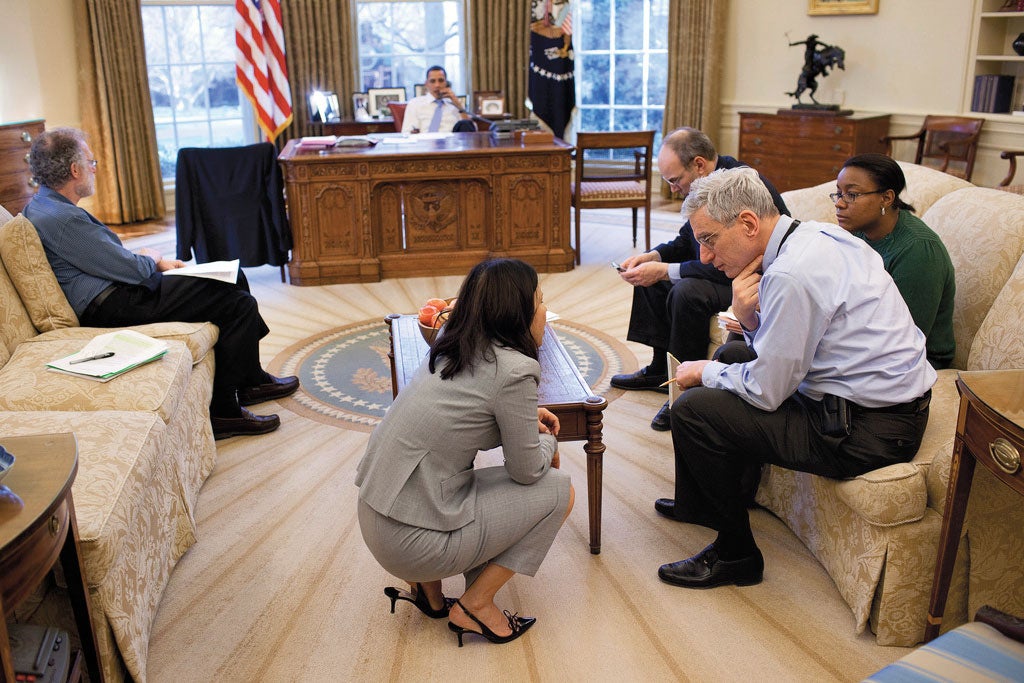
The Pace Was How Insane?
Meltzer: “There was an exhilarating quality to the pace and the number of interesting issues that passed through, and the adrenaline was clearly flowing, but it was frustrating and sometimes a little bit frightening to have to provide legal advice under ridiculously short time constraints on issues of some complexity about which one didn’t feel as informed as one would like to be. It felt like an avalanche when I arrived, and the avalanche did not feel much smaller when I left. It’s just a huge, huge volume of business.”
Barron: “The pace of the government seems extremely fast now. I would ask people who were in sub-Cabinet positions in the Clinton administration and were now working in the Obama White House, and they were all of the view that the pace of the government has quickened enormously. I think some of it is national security, maybe a lot of it, but there had also just been a big economic breakdown as well, and the war in Iraq and the war in Afghanistan, and the issues of terrorism—and that’s before you even get to the affirmative agenda.”
Freeman: “There were times when I would literally run to the White House in the morning, partly out of exhilaration and partly out of fear. There was just this sense of relentless incoming to manage, and at the same time we needed to be pushing the positive agenda forward. The pace has an impact. Your body chemistry changes. You either lose weight or gain it. And your family just gives up on you. Routinely, I was on a computer with two BlackBerries going at the same time. I saw my mother only once, for a single day, during this experience, when I met her in New York City. We were walking through the Museum of Modern Art, and then we went shoe shopping, and I was on two BlackBerries the whole time. She has a photo of me in MoMA frantically typing on two BlackBerries. No art. No shoes.”
How Polarized Is Washington Today?
Meltzer: “It seems much more partisan and nastier, and that was a source of enormous frustration. Whether you were talking about responding to the financial crisis, judicial nominations, or trying to respond sensibly to the threat of terrorism, it was just extremely difficult to find a basis for working things through in a cooperative and bipartisan way.”
Barron: “I have to say that given that the president was being impeached during a large portion of my time in the Clinton administration, polarization seems to be a feature of our government. You could get pessimistic, I guess, but I have somewhat of an optimistic read on it. As polarizing as things seemed, I’ve seen people with different legal priorities working together as hard as you could possibly work on the most challenging issues from a perspective of trying to get the law right. If that can happen, there’s a reason to be optimistic. There’s no doubt that it’s going on [extreme partisanship]—you can’t deny it—I’m just saying it’s not the whole story. I think for young lawyers coming through, it’s a mistake to think the only options are to choose up sides.”
Freeman: “It’s very hard to get anything done without a supermajority, which makes big structural reform really challenging and frustrating. That said, the president got the Recovery Act through, he got health care done, he got financial regulation done, because the Democrats pulled together. The question is, Can the same thing happen with climate change and energy? You’d think that the [BP] oil spill would have put a punctuation mark on the need to transition to cleaner forms of energy that are less dangerous for the environment and for the public—that it would have added some impetus to getting a bill passed. It was very disappointing to watch Congress instead only wanting to deal in an immediate sense with BP. That was a perfect instance where something positive could have come from a tragedy. You think, If nothing else helps the case, why doesn’t this? But the focus was already turning to the midterm elections.”
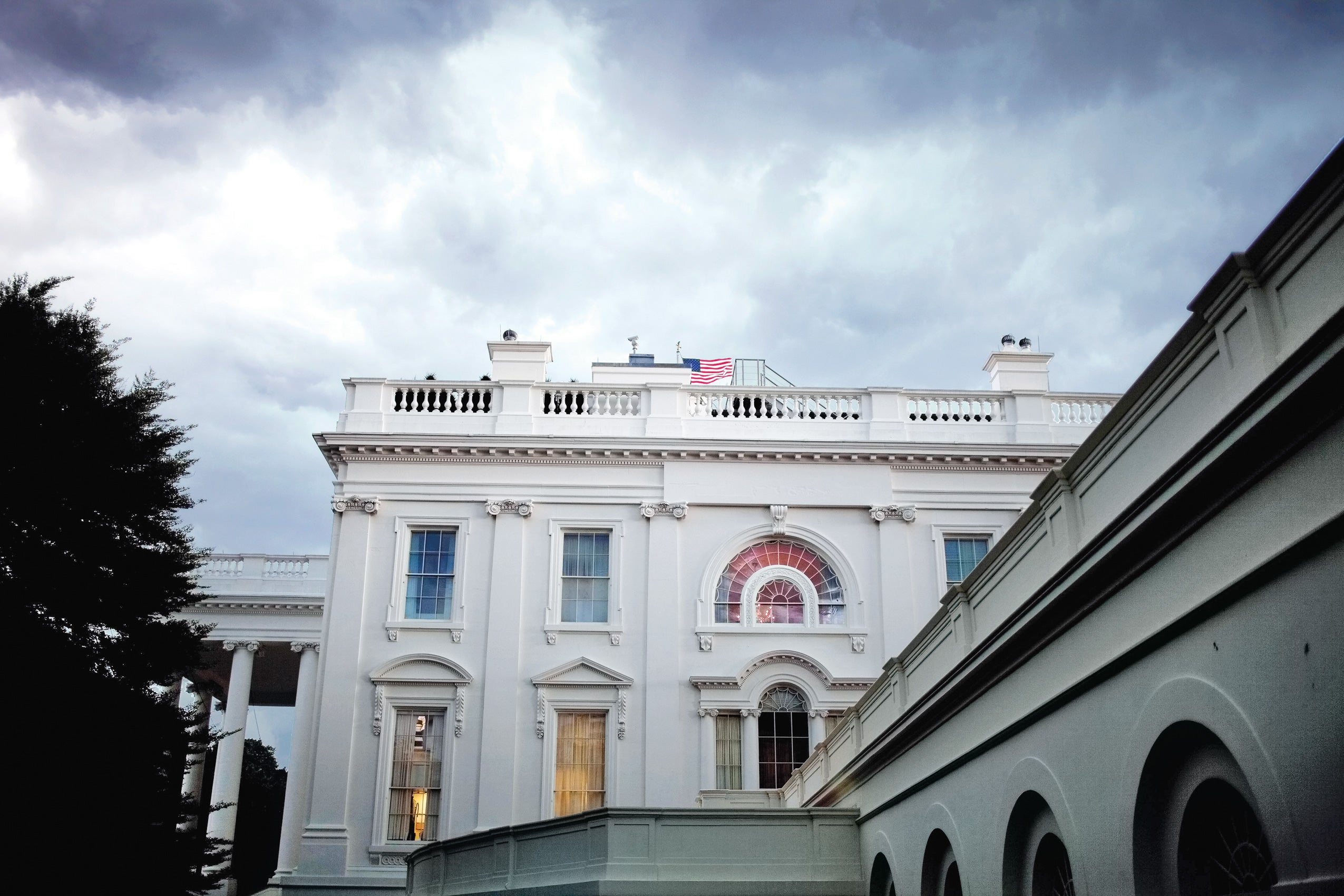
Funny White House Moments:
Meltzer: “The president had a Christmas dinner for senior staff which featured the unlikely combination of Bon Jovi and the Rockettes as the entertainment.”
Barron: “During the transition, all I had was my wife’s old BlackBerry, which didn’t have Internet service [Barron is married to Juliette Kayyem ’95, assistant secretary for intergovernmental affairs in the Department of Homeland Security]. It was just a phone, so that was my phone, and when I went to my first meeting for the transition, everybody whips out their BlackBerries and starts typing on them because an e-mail had just come in about some meeting, so I faked it—I pretended to type on it. I went home that night and said, ‘Juliette, we have to get this turned on because you obviously can’t operate in this city without one.’”
Freeman: “There were all kinds of very funny moments. At the White House Easter Egg Roll, the Easter Bunny tripped over a wire and the power temporarily went out. I mean … power outage … in the White House … due to Easter Bunny.
Impressions of President Obama:
Meltzer: “I arrived down there not really knowing the president, having only the smallest acquaintance with him from law school, so my sense of him was from having watched the campaign, but I was an enormous admirer. I left the White House being a still-greater admirer, which in some ways is surprising, because often when you have a chance to work at close range with someone, no matter how distinguished, his warts become more visible. But I thought he was a remarkably able, thoughtful, shrewd, wise and decent person, who was committed to trying to do the right thing in the extraordinarily difficult circumstances that he inherited. He also is a superb lawyer.”
Barron: “I think he’s an exceptional leader and, from all that you can tell, has a much longer view of things than most people are capable of having. He’s also just an exceptional lawyer. We didn’t have that much interaction with him, but there have been a lot of great lawyers who worked in the Office of Legal Counsel, and I can’t imagine any that could have worked for a better lawyer than the current president.”
Freeman: “He’s a very, very impressive person. It was really terrific to watch somebody who is so smart and strategic, so decisive and even-keeled. He also happens to really get our issues. I don’t know that any president before him has fully put it all together the way I think he does, in terms of the way the economic and energy challenges are related and represent an opportunity for the U.S. to gain a competitive advantage. And that always gives you hope, because if the guy at the top really understands this, then … ”
On Being Part of History:
Meltzer: “I never got to the point where it didn’t feel a little bit special to be walking into the West Wing every morning.”
Barron: “There is a shared spirit of good will, a very special environment, which makes it an unusually fulfilling experience for many people. It’s hard outside government to replicate that as a lawyer. In the adversarial system, you have your own team of lawyers. But it’s something distinct when the client is the United States of America.”
Freeman: “I had a feeling the entire time I was there that I was part of something special. There are all these indications that you aren’t somewhere normal—the Secret Service, Marine One landing on the lawn, seeing this or that world leader wander into the West Wing. But beyond the atmospherics, the work was special. I loved the substance. I loved working with really smart, dedicated people, and I’ll always feel lucky I got a chance to contribute.”
